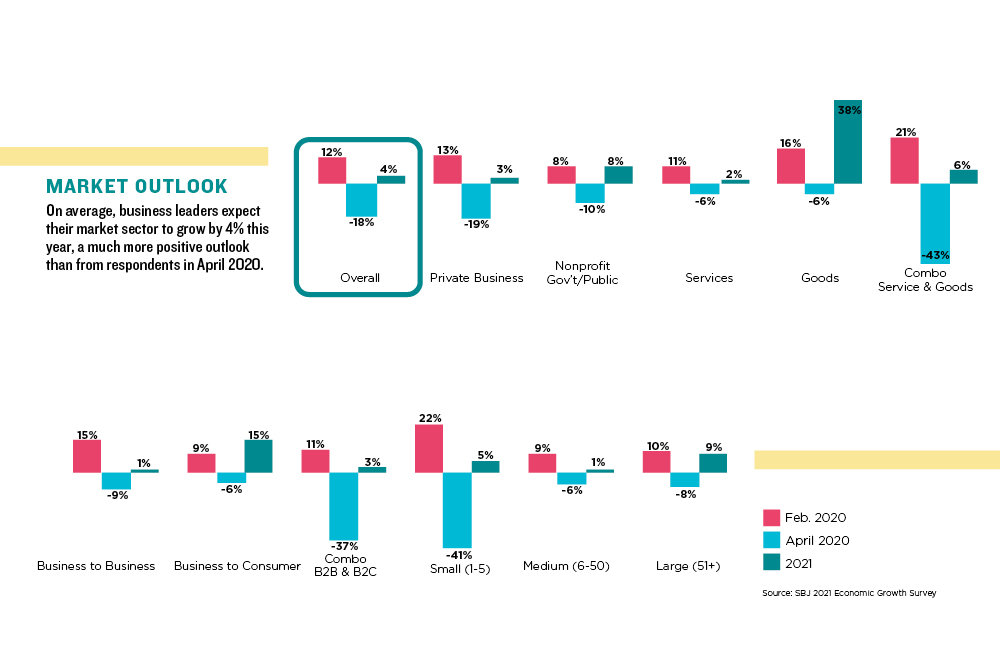YOUR BUSINESS AUTHORITY
Springfield, MO
YOUR BUSINESS AUTHORITY
Springfield, MO

Despite challenges faced over the past 16 months from the coronavirus pandemic, it’s not been a bad time to be in the grocery industry, says Michele Kauffman, Harter House marketing manager.
In fact, sales for the Springfield-based company far exceeded expectations last year, she says, as customers increased their grocery shopping purchases among its eight stores in the Ozarks.
“Being a grocery store, we absolutely increased volume, up to 50% over the previous year,” she says, declining to disclose figures. “It continued for all of 2020.”
Although this year hasn’t kept up at the same level, sales still outpace recent pre-pandemic years, she says. That fuels her optimism in continued growth for her employer, the grocery industry and the economy in general.
“We are still very confident in our business and all of our stores because we have such a good reputation,” she said. “The economy is still depressed but absolutely growing.”
It’s an outlook also reflected in Springfield Business Journal’s 2021 Economic Growth Survey. Nearly 70% of respondents to the survey, conducted in April by H2R Market Research, believe their market sectors will grow in the next year. The expected average growth rate is 4% – a stark contrast to the April 2020 survey, in which business leaders forecast an 18% decline.
However, survey participants in the business-to-consumer market were considerably more confident of growth, at 15%, compared with 1% of business-to-business respondents.
Confidence in the local economy also bounced back in this year’s survey. Roughly 50% of respondents say their confidence increased from a year prior, when 67% answered they felt less confident than in 2019. The local economy optimism in the year ahead was reflected equally among respondents in the business-to-business and business-to-consumer markets, as 49% in each category expressed higher confidence.
Joe Moore, owner of Full Octave Coffee Roasters LLC, says he felt trepidation when the pandemic first started last year as his business was entering its third year. But as the Ozark-based small-batch coffee roaster continued operations through 2020, he says confidence grew in both the stability of his business and the economy.
“I’m more confident than not,” he says. “On a zero to 10 level, I’m probably at around a seven, whereas during the pandemic last year, I was at maybe a four.”
Full Octave doesn’t have a brick-and-mortar shop and largely depends on sales at Farmers Market of the Ozarks, Moore says, declining to disclose annual revenue. Roughly 55% of Full Octave’s revenue is generated from the weekly outdoor market, followed by 25% of online sales shipped outside the Ozarks, he says. The remaining 20% comes from local direct orders and wholesale.
Moore says Full Octave is only in a few retailers, including Nature’s Wonders LLC in Branson, Akin’s Natural Foods and the East Sunshine Street store of MaMa Jean’s Natural Foods Market LLC. The small presence is intentional, he says, noting a desire to slowly scale up.
“I’m trying to be careful with the wholesale because you have to do volume, and I don’t have the capacity to do high volume,” he says. “But it’s been good for me to get into the stores. It sort of validates my company.”
Moore says a critical element to remain operating last year during the pandemic was his connections to coffee bean importers. Those include Houston, Texas-based Walker Coffee Trading LP and Irvington, New York-based Genuine Origin.
“They had enough coffee stocked in their warehouses to respond to keep roasters like me supplied,” he says.
Brian Hammons, president and CEO of Stockton-based black walnut processor Hammons Products Co., says growing consumer demand meeting up against pressures on large retailers could impact the amount of shelf space given to specialty products by his company and others. Hammons’ black walnut products include baked goods, cooking oil and chocolates.
“That could mean continued growth in online sales, but it could take a while for the volume to grow significantly,” he says via email.
Hammons says he’s bullish on 2021 for his company and the economy.
“Here in Missouri and the Springfield area, where businesses have stayed more open, we’re doing better than any of us imagined we’d be doing,” he says. “I’m always optimistic, and hopeful that the strength we’ve seen will continue as more sectors open up fully.”
Still, Harter House’s Kauffman has concerns the rising COVID-19 case numbers, both locally and nationally, could stifle economic growth. Local health officials say the recent increase in severe COVID-19 illness is projected to outpace hospital capacity.
As of July 14, Greene County’s seven-day average for cases was 220, with 230 hospitalized and 40% of the eligible population fully vaccinated, according to the Springfield-Greene County Health Department’s COVID-19 dashboard.
“I’m seeing it in my circle, so I know others are seeing it in the circle of people they know,” she says. “I felt like we were beginning to open up and everything was getting back to normal. All of a sudden, we’re seeing sickness again, which makes everybody back off.”
Missouri State University’s science building, built in 1971 and formerly called Temple Hall, is being reconstructed and updated.